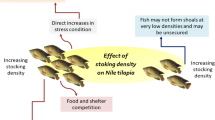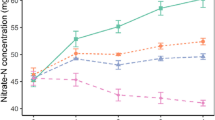Abstract
The use of 2H2O in tank water to assess protein synthesis rates in fish is a relatively novel methodology that could allow for a better understanding of the effects of particular nutritional and environmental variables on rates of protein accretion. As such, this study involved an assessment and comparison of protein synthesis rates in the muscle of juvenile red drum fed a control diet (nutritionally complete) versus a valine (Val)-deficient diet. Six groups of 12 juvenile red drum, initially weighing ~ 4.5 g/fish, were stocked in six separate 38-L aquaria operating as a recirculating system. Fish were acclimatized to experimental conditions for 2 weeks while being fed the control diet. Just prior to initiating the protein synthesis assay, one aquarium of fish was fed the control diet while a second aquarium of fish was fed the Val-deficient diet. Immediately after consuming the experimental diets, each group of fish was moved to an independent aquarium containing 2H2O, and the fractional synthetic rate (FSR) of protein synthesis was obtained at 12, 24, 36 and 48 h after feeding by collecting two fish per treatment at each time point. This protein synthesis assay procedure was performed in three separate sessions, and considered as replicates over time (n = 3) for fish fed the control or Val-deficient diets immediately before initiating the session. Results indicated that a one-time feeding of a diet deficient in Val significantly reduced protein synthesis rates in the muscle of red drum. In addition, a significant effect of time after feeding was found, where observed FSR values peaked at 12 h after feeding and decreased as time progressed. In conclusion, deuterium methodologies were applicable to red drum, and this approach had the sensitivity to assess differences in protein synthesis rates when dietary perturbations were introduced.

Similar content being viewed by others
Availability of data and materials
The data that support the findings of the present article are available upon reasonable request to the corresponding author.
Code availability
N/A
References
AOAC (2005) Official Methods of Analysis of the Association of Official Analytical Chemists. AOAC International, Gaithersburg
Carter CG, Houlihan DF (2001) Protein synthesis. Nitrogen excretion. In: Wright PA, Anderson PM (eds) Fish physiology, vol 20. Academic Press, New York, pp 31–75. https://doi.org/10.1016/S1546-5098(01)20003-X
Carter C, Owen S, He Z et al (1994) Determination of protein synthesis in rainbow trout, Oncorhynchus mykiss, using a stable isotope. J Exp Biol 189:279–284. https://doi.org/10.1242/jeb.189.1.279
Castillo S, Gatlin DM (2018) Dietary requirements for leucine, isoleucine and valine (branched-chain amino acids) by juvenile red drum Sciaenops ocellatus. Aquac Nutr 24:1056–1065. https://doi.org/10.1111/anu.12644
Castillo S, Halligan S, Gatlin DM (2015) Growth responses of juvenile red drum Sciaenops ocellatus to dietary phenylalanine and tyrosine can be used to calculate the total aromatic amino acid requirement1,2. J Nutr 145:2341–2346. https://doi.org/10.3945/jn.115.215848
De La Higuera M, Garzón A, Hidalgo MC et al (1998) Influence of temperature and dietary-protein supplementation either with free or coated lysine on the fractional protein-turnover rates in the white muscle of carp. Fish Physiol Biochem 18:85–95. https://doi.org/10.1023/A:1007723219594
Dufner DA, Bederman IR, Brunengraber DZ et al (2005) Using 2H2O to study the influence of feeding on protein synthesis: effect of isotope equilibration in vivo vs. in cell culture. Am J Physiol Metab 288:E1277–E1283. https://doi.org/10.1152/ajpendo.00580.2004
FAO (2020) The state of world fisheries and aquaculture 2020—Sustainability in action. Food and Agriculture Organization. http://www.fao.org/3/ca9229en/ca9229en.pdf. Accessed 20 Feb 2021
FAO (2021) Cultured aquatic species information programme Sciaenops ocellatus (Linnaeus, 1766). http://www.fao.org/fishery/culturedspecies/Sciaenops_ocellatus/en. Accessed 20 Feb 2021
Fauconneau B, Arnal M (1985) In vivo protein synthesis in different tissues and the whole body of rainbow trout (Salmo gairdnerii R.). Influence of environmental temperature. Comp Biochem Physiol A Comp Physiol 82:179–187. https://doi.org/10.1016/0300-9629(85)90723-6
Foster AR, Houlihan DF, Hall SJ, Burren LJ (1992) The effects of temperature acclimation on protein synthesis rates and nucleic acid content of juvenile cod (Gadus morhua L.). Can J Zool 70:2095–2102. https://doi.org/10.1139/z92-282
Fraser KPP, Rogers AD (2007) Protein metabolism in marine animals: the underlying mechanism of growth. Adv Mar Biol 52:267–362. https://doi.org/10.1016/S0065-2881(06)52003-6
Fraser KPP, Lyndon AR, Houlihan DF (1998) Protein synthesis and growth in juvenile Atlantic halibut, Hippoglossus hippoglossus (L.): application of 15N stable isotope tracer. Aquac Res 29:289–298. https://doi.org/10.1046/j.1365-2109.1998.00210.x
Gasier HG, Previs SF, Pohlenz C et al (2009a) A novel approach for assessing protein synthesis in channel catfish, Ictalurus punctatus. Comp Biochem Physiol Part B Biochem Mol Biol 154:235–238. https://doi.org/10.1016/j.cbpb.2009.06.012
Gasier HG, Riechman SE, Wiggs MP et al (2009b) A comparison of 2H2O and phenylalanine flooding dose to investigate muscle protein synthesis with acute exercise in rats. Am J Physiol Metab 297:E252–E259. https://doi.org/10.1152/ajpendo.90872.2008
Gasier HG, Fluckey JD, Previs SF (2010) The application of 2H2O to measure skeletal muscle protein synthesis. Nutr Metab 7:1–8. https://doi.org/10.1186/1743-7075-7-31
Gasier HG, Riechman SE, Wiggs MP et al (2011) Cumulative responses of muscle protein synthesis are augmented with chronic resistance exercise training. Acta Physiol 201:381–389. https://doi.org/10.1111/j.1748-1716.2010.02183.x
Gasier HG, Fluckey JD, Previs SF et al (2012) Acute resistance exercise augments integrative myofibrillar protein synthesis. Metabolism 61:153–156. https://doi.org/10.1016/j.metabol.2011.07.001
Gatlin DM III (2002) Red drum, Sciaenops ocellatus. In: Webster CL, Lim C (eds) Nutrient requirements and feeding of finfish for aquaculture. CABI publishing, New York, pp 147–158
Houlihan DF, McMillan DN, Laurent P (1986) Growth rates, protein synthesis, and protein degradation rates in rainbow trout: effects of body size. Physiol Zool 59:482–493. https://doi.org/10.1086/physzool.59.4.30158601
Houlihan DF, Hall SJ, Gray C, Noble BS (1988) Growth rates and protein turnover in Atlantic cod, Gadus morhua. Can J Fish Aquat Sci 45:951–964. https://doi.org/10.1139/f88-117
Houlihan DF, Waring CP, Mathers E, Gray C (1990) Protein synthesis and oxygen consumption of the shore crab Carcinus maenas after a meal. Physiol Zool 63:735–756. https://doi.org/10.1086/physzool.63.4.30158174
Houlihan DF, Carter CG, McCarthy ID (1995) Protein synthesis in fish. In: Hochachka PW, Mommsen TP (eds) Biochemistry and molecular biology of fishes, vol 4. Elsevier, New York, pp 191–220
Katanik J, McCabe BJ, Brunengraber DZ et al (2003) Measuring gluconeogenesis using a low dose of 2H2O: advantage of isotope fractionation during gas chromatography. Am J Physiol Metab 284:E1043–E1048. https://doi.org/10.1152/ajpendo.00485.2002
Katersky RS, Carter CG (2009) Growth and protein synthesis of barramundi, Lates calcarifer, fed lupin as a partial protein replacement. Comp Biochem Physiol Part A Mol Integr Physiol 152:513–517. https://doi.org/10.1016/j.cbpa.2008.12.017
Kaushik SJ, Seiliez I (2010) Protein and amino acid nutrition and metabolism in fish: current knowledge and future needs. Aquac Res 41:322–332. https://doi.org/10.1111/j.1365-2109.2009.02174.x
Kawanago M, Takemura S, Ishizuka R et al (2014) Leucine affects growth and hepatic growth-related factor gene expression in Japanese amberjack Seriola quinqueradiata. N Am J Aquac 76:415–422. https://doi.org/10.1080/15222055.2014.933752
Kawanago M, Takemura S, Ishizuka R, Shioya I (2015) Dietary branched-chain amino acid supplementation affects growth and hepatic insulin-like growth factor gene expression in yellowtail, Seriola quinqueradiata. Aquac Nutr 21:63–72. https://doi.org/10.1111/anu.12141
Kim SG, Buel GR, Blenis J (2013) Nutrient regulation of the mTOR complex 1 signaling pathway. Mol Cells 35:463–473. https://doi.org/10.1007/s10059-013-0138-2
Lamarre SG, Saulnier RJ, Blier PU, Driedzic WR (2015) A rapid and convenient method for measuring the fractional rate of protein synthesis in ectothermic animal tissues using a stable isotope tracer. Comp Biochem Physiol Part B Biochem Mol Biol 182:1–5. https://doi.org/10.1016/j.cbpb.2014.11.006
Lambert BS, Shimkus KL, Fluckey JD et al (2015) Anabolic responses to acute and chronic resistance exercise are enhanced when combined with aquatic treadmill exercise. Am J Physiol Metab 308:E192–E200. https://doi.org/10.1152/ajpendo.00689.2013
Lansard M, Panserat S, Plagnes-Juan E et al (2011) L-leucine, L-methionine, and L-lysine are involved in the regulation of intermediary metabolism-related gene expression in rainbow trout hepatocytes. J Nutr 141:75–80. https://doi.org/10.3945/jn.110.124511
Loughna PT, Goldspink G (1985) Muscle protein synthesis rates during temperature acclimation in a eurythermal (Cyprinus carpio) and a stenothermal (Salmo gairdneri) species of teleost. J Exp Biol 118:267–276. https://doi.org/10.1242/jeb.118.1.267
Lyndon AR, Houlihan DF, Hall SJ (1992) The effect of short-term fasting and a single meal on protein synthesis and oxygen consumption in cod, Gadus morhua. J Comp Physiol B 162:209–215
McCarthy ID, Houlihan DF, Carter CG (1994) Individual variation in protein turnover and growth efficiency in rainbow trout, Oncorhynchus mykiss (Walbaum). Proc R Soc London Ser B Biol Sci 257:141–147. https://doi.org/10.1098/rspb.1994.0107
McGoogan BB, Gatlin DM III (1998) Metabolic requirements of red drum, Sciaenops ocellatus, for protein and energy based on weight gain and body composition. J Nutr 128:123–129. https://doi.org/10.1093/jn/128.1.123
McMillan DN, Houlihan DF (1989) Short-term responses of protein synthesis to re-feeding in rainbow trout. Aquaculture 79:37–46. https://doi.org/10.1016/0044-8486(89)90443-2
Moon HY, Gatlin DM (1991) Total sulfur amino acid requirement of juvenile red drum, Sciaenops ocellatus. Aquaculture 95:97–106. https://doi.org/10.1016/0044-8486(91)90076-J
Morgan IJ, McCarthy ID, Metcalfe NB (2000) Life-history strategies and protein metabolism in overwintering juvenile Atlantic salmon: growth is enhanced in early migrants through lower protein turnover. J Fish Biol 56:637–647. https://doi.org/10.1111/j.1095-8649.2000.tb00761.x
Neill W (1987) Environmental requirements of red drum. In: Chamberlain GW, Miget RJ, Haby MG (eds), Manual on Red Drum Aquaculture. Texas Agricultural Extension Service, pp 105–108
Nilsson MI, Dobson JP, Greene NP et al (2013) Abnormal protein turnover and anabolic resistance to exercise in sarcopenic obesity. FASEB J 27:3905–3916. https://doi.org/10.1096/fj.12-224006
Owen SF, McCarthy ID, Watt PW et al (1999) In vivo rates of protein synthesis in Atlantic salmon (Salmo salar L.) smolts determined using a stable isotope flooding dose technique. Fish Physiol Biochem 20:87–94. https://doi.org/10.1023/A:1007724012975
Peragón J, Barroso JB, Garcia-Salguero L et al (1994) Dietary protein effects on growth and fractional protein synthesis and degradation rates in liver and white muscle of rainbow trout (Oncorhynchus mykiss). Aquaculture 124:35–46. https://doi.org/10.1016/0044-8486(94)90352-2
Peragón J, Barroso JB, García-Salguero L et al (2000) Dietary alterations in protein, carbohydrates and fat increase liver protein-turnover rate and decrease overall growth rate in the rainbow trout (Oncorhynchus mykiss). Mol Cell Biochem 209:97–104. https://doi.org/10.1023/A:1007130906365
Peragon J, Barroso JB, Garcıa-Salguero L et al (2001) Growth, protein-turnover rates and nucleic-acid concentrations in the white muscle of rainbow trout during development. Int J Biochem Cell Biol 33:1227–1238. https://doi.org/10.1016/S1357-2725(01)00088-7
Shimkus KL, Shirazi-Fard Y, Wiggs MP et al (2018) Responses of skeletal muscle size and anabolism are reproducible with multiple periods of unloading/reloading. J Appl Physiol 125:1456–1467. https://doi.org/10.1152/japplphysiol.00736.2017
Topic Popovic N, Strunjak-Perovic I, Coz-Rakovac R et al (2012) Tricaine methane-sulfonate (MS-222) application in fish anaesthesia. J Appl Ichthyol 28:553–564. https://doi.org/10.1111/j.1439-0426.2012.01950.x
Wu G, Bazer FW, Dai Z et al (2014) Amino acid nutrition in animals : protein synthesis and beyond . Annu Rev Anim Biosci. https://doi.org/10.1146/annurev-animal-022513-114113
Yang D, Diraison F, Beylot M et al (1998) Assay of low deuterium enrichment of water by isotopic exchange with [U-13C3] acetone and gas chromatography–mass spectrometry. Anal Biochem 258:315–321. https://doi.org/10.1006/abio.1998.2632
Yuan CL, Sharma N, Gilge DA et al (2008) Preserved protein synthesis in the heart in response to acute fasting and chronic food restriction despite reductions in liver and skeletal muscle. Am J Physiol Metab 295:E216–E222. https://doi.org/10.1152/ajpendo.00545.2007
Acknowledgements
Financial support for this research was provided by Texas A&M AgriLife Research. At the time of this study, Sergio Castillo was a Tom Slick Senior Graduate Fellow at Texas A&M University. The authors gratefully acknowledge the assistance provided by Mr. Alejandro Velasquez for processing the amino acid data for this study, and Mr. Brian Ray for the technical support during the feeding trial.
Funding
Texas A&M AgriLife Research.
Author information
Authors and Affiliations
Corresponding author
Ethics declarations
Conflict of interest
The authors declare there are no conflicting/competing interests.
Ethical approval
This study was carried out with the compliance of the Institutional Animal Care and Use Committee at Texas A&M University (IACUC 2016–0368).
Informed consent
No informed consent is required for this study.
Consent for publication
N/A
Additional information
Handling editor: N. Le Floc'h.
Publisher's Note
Springer Nature remains neutral with regard to jurisdictional claims in published maps and institutional affiliations.
Rights and permissions
About this article
Cite this article
Castillo, S., Yamamoto, F.Y., O’Reilly, C. et al. Use of deuterium oxide (2H2O) to assess muscle protein synthesis in juvenile red drum (Sciaenops ocellatus) fed complete, and valine-deficient diets. Amino Acids 53, 1431–1439 (2021). https://doi.org/10.1007/s00726-021-03036-1
Received:
Accepted:
Published:
Issue Date:
DOI: https://doi.org/10.1007/s00726-021-03036-1




